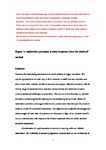Rigour in moderation processes is more important than the choice of method
| dc.contributor.author | Zahra, Daniel | |
| dc.contributor.author | Robinson, Iain | |
| dc.contributor.author | Roberts, Martin | |
| dc.contributor.author | Coombes, L | |
| dc.contributor.author | Cockerill, Josephine | |
| dc.contributor.author | Burr, Steven | |
| dc.date.accessioned | 2017-05-22T16:28:14Z | |
| dc.date.available | 2017-05-22T16:28:14Z | |
| dc.date.issued | 2016-09-21 | |
| dc.identifier.issn | 0260-2938 | |
| dc.identifier.issn | 1469-297X | |
| dc.identifier.uri | http://hdl.handle.net/10026.1/9308 | |
| dc.description | doi: 10.1080/02602938.2016.1236183 AbstractProcesses for moderating assessments are much debated in higher education. The myriad approaches to the task vary in their demands on staff time and expertise, and also in how valid, reliable and fair to students they appear. Medical education, with its diverse range of assessments and assessors across clinical and academic domains presents additional challenges to moderation. The current review focuses on medical education, considering double-marking and benchmarking as two broad classes of moderation procedure, and argues that it is the process more than the type of procedure which is crucial for successful moderation. The advantages and disadvantages of each class of procedure are discussed in the light of our medical school?s current practices, and with respect to the limited empirical evidence within medical education assessment. Consideration of implementation is central to ensuring valid and reliable moderation. The reliability of assessor judgements depends more on the consistency of assessment formats and the application of clear and agreed assessment criteria than on the moderation process itself. This article considers these factors in relation to their impact on the reliability of moderation, and aims to help assessors and students appreciate the diversity of these factors by facilitating their consideration in the assessment process. | |
| dc.description.abstract |
AbstractProcesses for moderating assessments are much debated in higher education. The myriad approaches to the task vary in their demands on staff time and expertise, and also in how valid, reliable and fair to students they appear. Medical education, with its diverse range of assessments and assessors across clinical and academic domains presents additional challenges to moderation. The current review focuses on medical education, considering double-marking and benchmarking as two broad classes of moderation procedure, and argues that it is the process more than the type of procedure which is crucial for successful moderation. The advantages and disadvantages of each class of procedure are discussed in the light of our medical school?s current practices, and with respect to the limited empirical evidence within medical education assessment. Consideration of implementation is central to ensuring valid and reliable moderation. The reliability of assessor judgements depends more on the consistency of assessment formats and the application of clear and agreed assessment criteria than on the moderation process itself. This article considers these factors in relation to their impact on the reliability of moderation, and aims to help assessors and students appreciate the diversity of these factors by facilitating their consideration in the assessment process. | |
| dc.format.extent | 1-9 | |
| dc.language | en | |
| dc.language.iso | en | |
| dc.publisher | Routledge | |
| dc.subject | Moderation | |
| dc.subject | double-marking | |
| dc.subject | benchmarking | |
| dc.subject | medical education | |
| dc.title | Rigour in moderation processes is more important than the choice of method | |
| dc.type | journal-article | |
| dc.type | JOUR | |
| plymouth.author-url | http://dx.doi.org/10.1080/02602938.2016.1236183 | |
| plymouth.issue | 7 | |
| plymouth.volume | 42 | |
| plymouth.publication-status | Published | |
| plymouth.journal | Assessment & Evaluation in Higher Education | |
| dc.identifier.doi | 10.1080/02602938.2016.1236183 | |
| plymouth.organisational-group | /Plymouth | |
| plymouth.organisational-group | /Plymouth/Faculty of Health | |
| plymouth.organisational-group | /Plymouth/Faculty of Health/Peninsula Medical School | |
| plymouth.organisational-group | /Plymouth/REF 2021 Researchers by UoA | |
| plymouth.organisational-group | /Plymouth/REF 2021 Researchers by UoA/UoA23 Education | |
| plymouth.organisational-group | /Plymouth/Research Groups | |
| plymouth.organisational-group | /Plymouth/Research Groups/Institute of Translational and Stratified Medicine (ITSMED) | |
| plymouth.organisational-group | /Plymouth/Research Groups/Institute of Translational and Stratified Medicine (ITSMED)/CBR | |
| plymouth.organisational-group | /Plymouth/Research Groups/Plymouth Institute of Health and Care Research (PIHR) | |
| plymouth.organisational-group | /Plymouth/Users by role | |
| plymouth.organisational-group | /Plymouth/Users by role/Academics | |
| dcterms.dateAccepted | 2016-09-10 | |
| dc.rights.embargodate | 2018-3-21 | |
| dc.identifier.eissn | 1469-297X | |
| dc.rights.embargoperiod | No embargo | |
| rioxxterms.versionofrecord | 10.1080/02602938.2016.1236183 | |
| rioxxterms.licenseref.uri | http://www.rioxx.net/licenses/all-rights-reserved | |
| rioxxterms.licenseref.startdate | 2016-09-21 | |
| rioxxterms.type | Journal Article/Review |


